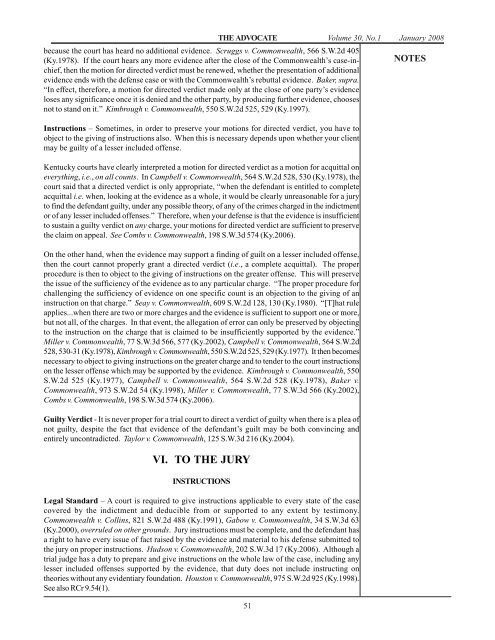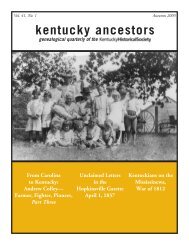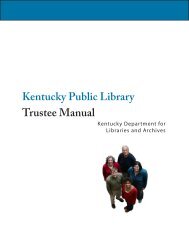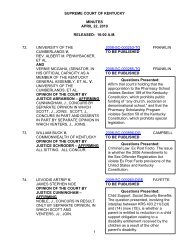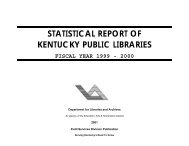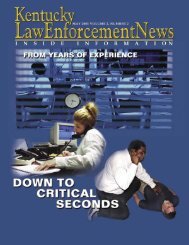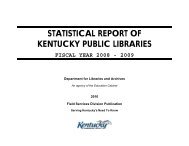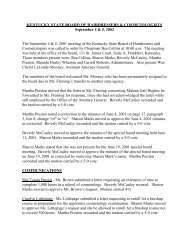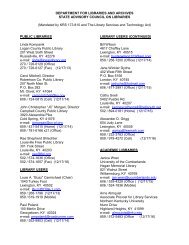Jan08 Advo.pmd - e-archives Home
Jan08 Advo.pmd - e-archives Home
Jan08 Advo.pmd - e-archives Home
Create successful ePaper yourself
Turn your PDF publications into a flip-book with our unique Google optimized e-Paper software.
THE ADVOCATE Volume 30, No.1 January 2008<br />
because the court has heard no additional evidence. Scruggs v. Commonwealth, 566 S.W.2d 405<br />
(Ky.1978). If the court hears any more evidence after the close of the Commonwealth’s case-inchief,<br />
then the motion for directed verdict must be renewed, whether the presentation of additional<br />
evidence ends with the defense case or with the Commonwealth’s rebuttal evidence. Baker, supra.<br />
“In effect, therefore, a motion for directed verdict made only at the close of one party’s evidence<br />
loses any significance once it is denied and the other party, by producing further evidence, chooses<br />
not to stand on it.” Kimbrough v. Commonwealth, 550 S.W.2d 525, 529 (Ky.1997).<br />
Instructions – Sometimes, in order to preserve your motions for directed verdict, you have to<br />
object to the giving of instructions also. When this is necessary depends upon whether your client<br />
may be guilty of a lesser included offense.<br />
Kentucky courts have clearly interpreted a motion for directed verdict as a motion for acquittal on<br />
everything, i.e., on all counts. In Campbell v. Commonwealth, 564 S.W.2d 528, 530 (Ky.1978), the<br />
court said that a directed verdict is only appropriate, “when the defendant is entitled to complete<br />
acquittal i.e. when, looking at the evidence as a whole, it would be clearly unreasonable for a jury<br />
to find the defendant guilty, under any possible theory, of any of the crimes charged in the indictment<br />
or of any lesser included offenses.” Therefore, when your defense is that the evidence is insufficient<br />
to sustain a guilty verdict on any charge, your motions for directed verdict are sufficient to preserve<br />
the claim on appeal. See Combs v. Commonwealth, 198 S.W.3d 574 (Ky.2006).<br />
On the other hand, when the evidence may support a finding of guilt on a lesser included offense,<br />
then the court cannot properly grant a directed verdict (i.e., a complete acquittal). The proper<br />
procedure is then to object to the giving of instructions on the greater offense. This will preserve<br />
the issue of the sufficiency of the evidence as to any particular charge. “The proper procedure for<br />
challenging the sufficiency of evidence on one specific count is an objection to the giving of an<br />
instruction on that charge.” Seay v. Commonwealth, 609 S.W.2d 128, 130 (Ky.1980). “[T]hat rule<br />
applies...when there are two or more charges and the evidence is sufficient to support one or more,<br />
but not all, of the charges. In that event, the allegation of error can only be preserved by objecting<br />
to the instruction on the charge that is claimed to be insufficiently supported by the evidence.”<br />
Miller v. Commonwealth, 77 S.W.3d 566, 577 (Ky.2002), Campbell v. Commonwealth, 564 S.W.2d<br />
528, 530-31 (Ky.1978), Kimbrough v. Commonwealth, 550 S.W.2d 525, 529 (Ky.1977). It then becomes<br />
necessary to object to giving instructions on the greater charge and to tender to the court instructions<br />
on the lesser offense which may be supported by the evidence. Kimbrough v. Commonwealth, 550<br />
S.W.2d 525 (Ky.1977), Campbell v. Commonwealth, 564 S.W.2d 528 (Ky.1978), Baker v.<br />
Commonwealth, 973 S.W.2d 54 (Ky.1998), Miller v. Commonwealth, 77 S.W.3d 566 (Ky.2002),<br />
Combs v. Commonwealth, 198 S.W.3d 574 (Ky.2006).<br />
Guilty Verdict - It is never proper for a trial court to direct a verdict of guilty when there is a plea of<br />
not guilty, despite the fact that evidence of the defendant’s guilt may be both convincing and<br />
entirely uncontradicted. Taylor v. Commonwealth, 125 S.W.3d 216 (Ky.2004).<br />
VI. TO THE JURY<br />
INSTRUCTIONS<br />
Legal Standard – A court is required to give instructions applicable to every state of the case<br />
covered by the indictment and deducible from or supported to any extent by testimony.<br />
Commonwealth v. Collins, 821 S.W.2d 488 (Ky.1991), Gabow v. Commonwealth, 34 S.W.3d 63<br />
(Ky.2000), overruled on other grounds. Jury instructions must be complete, and the defendant has<br />
a right to have every issue of fact raised by the evidence and material to his defense submitted to<br />
the jury on proper instructions. Hudson v. Commonwealth, 202 S.W.3d 17 (Ky.2006). Although a<br />
trial judge has a duty to prepare and give instructions on the whole law of the case, including any<br />
lesser included offenses supported by the evidence, that duty does not include instructing on<br />
theories without any evidentiary foundation. Houston v. Commonwealth, 975 S.W.2d 925 (Ky.1998).<br />
See also RCr 9.54(1).<br />
51<br />
NOTES


